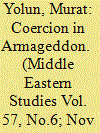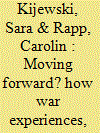|
|
|
Sort Order |
|
|
|
Items / Page
|
|
|
|
|
|
|
| Srl | Item |
| 1 |
ID:
180033


|
|
|
|
|
| Summary/Abstract |
The coercion that the Ottoman government and army established over its subjects during the Great War remained a significant factor in the war experience of the conscripts despite its limitations. Coercion is one of the most significant answers of why the Ottoman soldiers endured such a destructive warfare, in spite of war attrition, virulent epidemic diseases, malnutrition, maltreatment, thirst, and harsh climatic conditions. The Ottoman government exercised remarkable coercion over not only the conscripts but also society and economy, demanding an unconditional loyalty for the survival of the empire. Training, military penal code, religious ideology and narrative that legitimized the warfare were the instruments of coercion. This study will contribute to the social history of the Ottoman conscripts during the First World War.
|
|
|
|
|
|
|
|
|
|
|
|
|
|
|
|
| 2 |
ID:
169003


|
|
|
|
|
| Summary/Abstract |
How does civil war shape the prospects of lasting peace between formerly opposing ethnic groups after the end of violence? This article addresses the complex relationship between war experience, interethnic attitudes, interethnic forgiveness, and the willingness to permit basic civil liberties to former enemies in the context of postwar Sri Lanka. Despite the end of the 26-year-long civil war in 2009, social and political tensions between the two largest ethnic groups, the Sinhalese and the Sri Lankan Tamils, still prevail. Political tolerance is in the literature considered a crucial micro-level condition for peaceful coexistence, yet, its determinants, in particular the role of war experiences, have not received sufficient attention. Using new and unique all-island representative survey data (N = 1,420), we examine the mutual permission of civil liberties of these two ethnic groups. Our analyses reveal two important findings: first, the likelihood of granting civil liberties varies by civil liberty and ethnic group. Whereas most members of both ethnic groups are willing to grant the right to vote, to hold a speech, and to hold a government position, the right to demonstrate is highly contested, with only low shares of both Tamils and Sinhalese being willing to grant the other group this right. Second, the structural equation models reveal that the direct impact of war exposure is less powerful than expected and depends on the political right in question. Not forgiving the other ethnic group, partly driven by war experience and ethnic prejudice, appears to be a more consistent predictor of intolerance. These results imply that postwar efforts to further forgiveness are important to promote political tolerance and thereby long-lasting peace.
|
|
|
|
|
|
|
|
|
|
|
|
|
|
|
|
| 3 |
ID:
151649


|
|
|
|
|
| Summary/Abstract |
War experiences are a material of political currency, invoked, appropriated, and ‘written’ in particular configurations to sustain, complicate, and contest narratives about war. This occurs through and within the same relations of power that are intrinsic to the conduct of war as war-experiencing subjects comprise a political vocabulary of selves and others that populate and operate within war’s wider social (re)production. To track these power relations and consider implications for how dominant accounts of war can be complicated and contested, the article is grounded in an analysis of the visual regimes at work in footage, photographs, and testimony relating to the shooting of a group of people by an American Apache helicopter in Baghdad, Iraq in 2007. The event was publicised on a dedicated website and dubbed ‘Collateral Murder’ by WikiLeaks in 2010. Analysis of the website reveals how visual modes and the experiences of war subjects accompany each other, revealing war in contrasting locations of sight and violence: the ‘view from above’, the ‘view from below’, and the view of the ‘on-the-ground’ soldier eyewitness. Taken together these discursively produce ‘Collateral Murder’ and contest the dominance of war known through the experience of those who wage it ‘from above’.
|
|
|
|
|
|
|
|
|
|
|
|
|
|
|
|
|
|
|
|
|